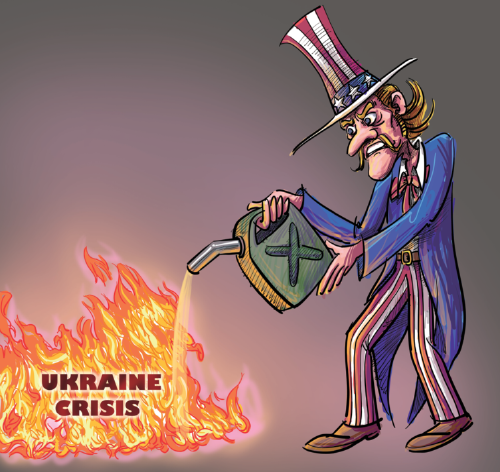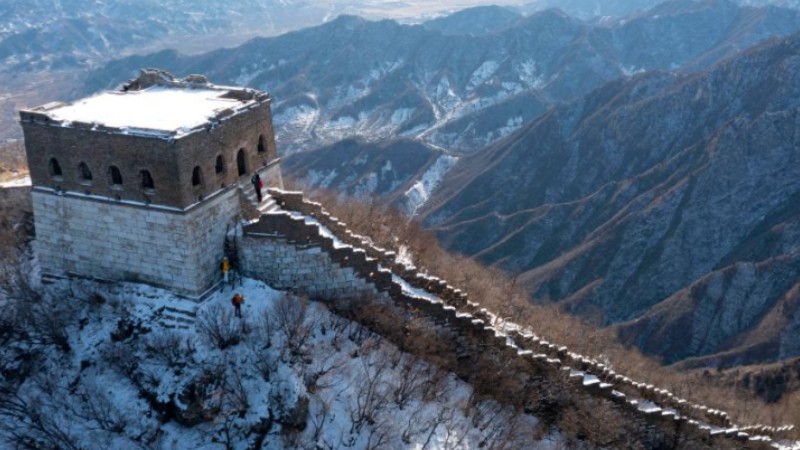Shifting geopolitics amid Ukraine crisis

JIN DING/CHINA DAILY
Before the outbreak of the Ukraine crisis in 2014, Russia-US competition was the main cause of global geopolitical conflicts. Since the end of the Cold War in the 1990s, the US has been fueling antagonism, conflicts and wars in different countries, and "color revolution" in many states around the world in order to maintain its global hegemony. Russia, as the successor state of the Soviet Union, was unable to continue the competition with the US on the global stage, hence it chose to retain its traditional influence in Eurasia and the Middle East. Therefore Ukraine became a key factor in the Russia-US competition in Eurasia.
Regarding Russia as a bigger threat than China, the US has emphasized both cooperation and competition with China, so it could concentrate resources in winning the competition with Russia.
After 2014, Ukraine's ties with Russia started souring as it veered toward the US-led West, becoming a bridgehead for the US-led North Atlantic Treaty Organization to more directly target Russia. After political upheavals and some regime changes, the disputes between the Ukraine-West combine and Russia led to the Russia-Ukraine conflict in February 2022.
The conflict exposed the US' ambition to use Ukraine as a front to weaken Russia and reduce its influence in Eurasia. And the US took advantage of the Russia-Ukraine conflict to strengthen its hold over Europe and drive a wedge between Europe and Russia, and Europe and China.
The Ukraine crisis, along with the change of power in China, Russia and the US, prompted the three major global powers to change their global strategies. The US no longer regards Russia as a major global power and primary threat, and its policy toward Russia has shifted from strategic competition to intensive efforts to "suppress" Russia.
The 2022 US National Security Strategy labels China as "America's most consequential geopolitical challenge", and says Russia "poses an immediate and ongoing threat to the regional security order in Europe and it is a source of disruption and instability globally but it lacks the across the spectrum capabilities of the PRC". As such, the US has called on its NATO allies to continue combating Russia and stepped up its long-term strategy to contain China.
Despite China repeatedly asserting it believes in resolving differences through dialogue and adheres to the policy of peace and cooperation, the US has accused China of backing Russia in the Ukraine crisis and even sanctioned some Chinese companies for doing business with their Russian counterparts. China is not a participant in the Ukraine conflict and wants Russia and Ukraine to end it soon.
Yet the US deliberately links the Ukraine issue with the Taiwan question, when the fact is they are completely different. Washington is working hard to curb China's rise by creating tensions.
Facing the conflict with Ukraine and sanctions from the West, Russia is seeking non-Western trade and economic partners and therefore, attaches greater importance to Sino-Russian strategic partnership of coordination, which Russian President Vladimir Putin praised on Dec 30, 2022.
For China, in fact, both Russia and Ukraine are strategic as well as important cooperative partners in the Belt and Road Initiative. And the Russia-Ukraine conflict does not benefit anyone. Instead, it has harmed China's economic and cultural cooperation with both countries.
In these difficult times, therefore, China should establish a global network of partnerships and promote the building of a new type of international relations. China considers international issues and relations on their own merits and conducts in accordance with its diplomatic principles and national interests.
China's development policy is to promote win-win cooperation with other countries and help build a community with a shared future for mankind. China will not succumb to the US' diplomatic coercion on the Ukraine issue. In fact, it is working hard to prevent further deterioration of bilateral ties with the US, although it will not compromise even an inch of sovereignty and territorial integrity.
China has exchanged views with the Kyiv government on the situation in Ukraine, provided humanitarian supplies for the country, and has been working with the international community to help resolve the Ukraine crisis.
During a meeting with German Chancellor Olaf Scholz in November 2022, President Xi Jinping stressed that China supports Germany and the European Union to promote peace talks. China and Germany jointly opposed the use of threat or nuclear weapons in the Ukraine conflict.
Later, in a meeting with US President Joe Biden, President Xi reiterated that China follows a policy of co-development and emphasized the importance of abandoning the zero-sum game.
The relationship between China and Russia, on the other hand, is a strategic partnership of coordination but it's not an alliance. China proposed "no limit, no forbidden zone, and no ceiling" in developing China-Russia strategic cooperation and believes Sino-Russian cooperation has great potential, and hopes to continue developing good-neighborly, friendly and win-win cooperation. China-Russia ties have maintained a high level of cooperation thanks to the efforts of both sides.
China has also reiterated that "nonalignment, non-confrontation and non-targeting of any third party" is the foundation of Sino-Russian ties, which was stressed, once again, by Foreign Minister Qin Gang during his meeting with his Russian counterpart Sergey Lavrov.
Deepening cooperation in economic, trade, security and cultural fields, and the necessity to build a more just world order, by among other things, condemning hegemonism and power politics, have prompted China and Russia to strengthen cooperation.
And the US, not able to accept this development, has created a "new normal" between the three powers, not only checking China and Russia's development, but also strengthening confrontations with the two countries. In the trilateral relations, it is foreseeable that China will mainly make active efforts to develop a stable and stronger strategic partnership of coordination with Russia, and make efforts to decrease trust deficit with the US. Thus, China can help boost global economic recovery and restore strategic stability.
Photos
Related Stories
- 105 Ukrainian soldiers undergo Leopard 2 tank training in Poland
- EU leaders fail to agree on Ukraine, migration policy at extraordinary summit
- EU assures Ukraine of support as Zelensky visits Brussels
- NATO must not be part of Russia-Ukraine conflict: German Chancellor
- Ukrainian president visits Britain for defense cooperation
Copyright © 2023 People's Daily Online. All Rights Reserved.









